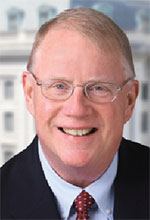Reflection / Dan Conway
Bishops seek civility, compassion and courage
 Where do we find truth in an era marked by conflict, confusion and intense—even violent—disagreement?
Where do we find truth in an era marked by conflict, confusion and intense—even violent—disagreement?
During a June 13 press conference to announce his appointment as the new shepherd for the Church in central and southern Indiana, Archbishop-designate Charles C. Thompson of Indianapolis said that he usually finds the truth “in the middle” and not at either extreme (right or left) of any argument. Beware of ideologies, the archbishop said in his remarks. Truth can only be found in “Christ the Cornerstone”—Archbishop Thompson’s episcopal motto.
The archbishop might have been speaking for the body of American bishops who met in Indianapolis on June 14-15. Much of their discussion during the two day-meeting of the U.S. Conference of Catholic Bishops (USCCB) involved public policy issues that are anything but clear and simple: religious liberty, health care reform, immigration, religious persecution and human rights, outreach to young people who are angry or estranged, protection of children and youth, marriage and family life, poverty and violence.
Truth is found in the person of Jesus Christ, and in the way that he responded to these and many other issues in his day and time.
From a Christ-centered perspective, public policy issues can be seen as both complex and simple. They can be viewed as matters of principle that must be addressed simply—with civility, compassion and courage. They can also be seen as challenges that require extraordinary leadership to achieve unity, consensus and, when necessary, the kind of disagreement that is respectful of the dignity and human rights of all.
In health care reform, for example, the bishops expressed five fundamental principles that are non-negotiable: 1) respect for life; 2) access for all; 3) true affordability; 4) comprehensive and high quality, and 5) no repeal without adequate replacement. These concepts are clear and simple, but of course their implementation in the current political environment requires a great deal of complex negotiation and give-and-take.
The role of bishops in all these matters is simple but not easy. Bishops are called to represent “Christ the Cornerstone” and to carry on his ministry with civility, compassion and courage. Bishops must defend the dignity of all human life. They must advocate for the poor, the marginalized and the vulnerable. They must be prophetic—challenging political leaders (and all of us) to set aside our differences and our ideologies in order to care for one another and to reach consensus based on our concern for the common good.
Archbishop-Emeritus Daniel M. Buechlein of Indianapolis was not able to attend this meeting due to ill health, but he was certainly present in spirit. His counsel to his brother bishops would certainly have been to “look to Peter” (our Holy Father Pope Francis), and to walk with him in addressing complex social and political problems.
Certainly the themes of civility, compassion and courage reflect the teaching and petrine ministry of Pope Francis. He does not condemn his enemies or political opponents. He goes out of his way to show love and mercy to all—especially the most vulnerable and neglected members of our human family. And he is a man of deep courage who casts aside things that are comfortable and convenient in order to go out to the peripheries and be Christ to those who need him most.
Most bishops, including Archbishop-designate Thompson, are sensible. They avoid extreme positions on issues, and they shy away from impulsive, intemperate actions. Unfortunately, we are not living in sensible times—here in the United States or throughout the world. We are living in an era of tension and violence which devalues human life and dignity and which marginalizes increasing numbers of people, especially the poor, minorities, strangers and people with disabilities.
Our bishops need to move beyond their comfort zones to stand with those who most need their advocacy and solidarity. They must find ways of speaking the truth in love to people who disagree, or who simply don’t understand the principles involved. Their voices must be the voice of Jesus—not condemning the world or rejecting those who fail to carry out the great commandment to love God and our neighbor, but showing by their words and example that love is stronger than sin and death.
As he himself has said, Archbishop-designate Thompson has been given the opportunity—and the challenge—to build on foundations built by his predecessors in the office of archbishop of Indianapolis.
To succeed, he must rely on “Christ the Cornerstone,” and he must practice civility, compassion and courage in all aspects of his ministry. Of course, he will also need the support of our prayers.
(Daniel Conway is a member of The Criterion’s editorial committee.) †
 Where do we find truth in an era marked by conflict, confusion and intense—even violent—disagreement?
Where do we find truth in an era marked by conflict, confusion and intense—even violent—disagreement?